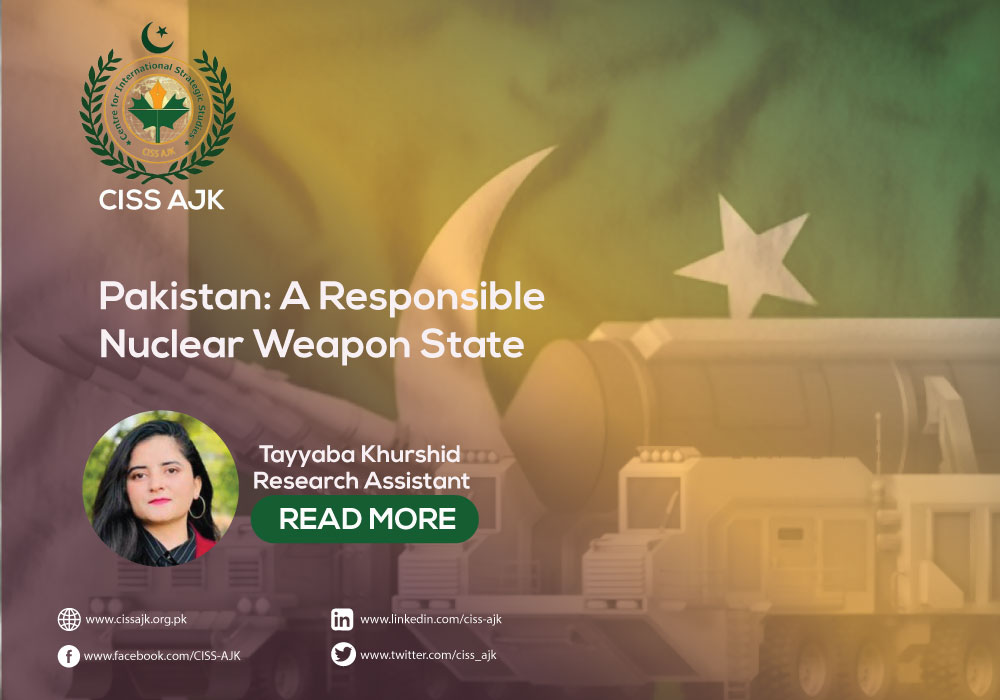696
Many states have used nuclear energy worldwide to overcome energy challenges, and Pakistan’s peaceful nuclear programme is a great success. Realizing the true potential of nuclear energy, Pakistan developed a comprehensive framework for its peaceful use. Pakistan’s nuclear programme is safe and robust. Pakistan has always been a responsible nuclear weapon state and therefore except for baseless allegations, there has never been a single i-stance of theft of nuclear material.
Although Pakistan didn’t sign the Nuclear Non-Proliferation Treaty (NPT) due to its deep security concerns, it cooperates and works closely with the International Atomic Energy Agency (IAEA). The IAEA is an intergovernmental organization that promotes and regulates peaceful use of nuclear energy. Its mandate is to accelerate and enlarge the contribution of atomic energy to peace, health and prosperity throughout the world.
Pakistan signed a safeguard agreement with the IAEA in 2005 that allows it to inspect Pakistan’s civilian nuclear facilities and their use for peaceful purposes only. It also covers the export and import of nuclear weapons. Along with this agreement, Pakistan’s internal nuclear security regime is also comprehensive, including both a legislative and regulatory framework that governs nuclear safety and security. The Pakistan National Command Authority is the apex decision-making body in all nuclear related matters with an effective and robust command and control system.
For regulation of nuclear safety and protection of radiation, transport and waste of nuclear material, Pakistan has developed the Pakistan Nuclear Regulatory Authority (PNRA). The ‘Regulations on Security of Radioactive Sources’ is in line with the IAEA Code of Conduct on nuclear safety and security of radioactive resources and its two supplementary guidance documents.
The Strategic Export Control Division (SECDIV) looks upon the export controls to monitor the items that can be used for development of Nuclear, Chemical or biological weapons or their delivery systems. Pakistan has strengthened the control on exports of nuclear, biological and related materials and their delivery systems through the Export Control Act of 2004. The National Control Lists are reviewed periodically as per the changes made by International export control regimes.
Hence, it is very essential that Pakistan should focus on the restructuring of its finances and capital to improve its economic situation that will solve the other problems. Nuclear technology and its peaceful use is what all the states are seeking to improve their energy needs. Yet, a strong financial backing to support the nuclear programme for peaceful use is crucial for long term sustenance and stability. The majority of issues that Pakistan is facing today are due to the weakness of the economy. Hence, when the state’s finances will be in order, only then nuclear power can be a long-term solution to our health, environmental and energy problems.
Pakistan has successfully implemented the IAEA nuclear security programme and contributes to and benefits from the IAEA regarding the security of nuclear material as per its mandate.
IAEA Director General Mr. Rafael Mariano Grossi recently was in Pakistan for a two-day visit and inspected six nuclear sites of Pakistan. He acknowledged Pakistan’s technical and engineering capacity for new nuclear power plants, including small modular reactors.
As Pakistan is the country that suffers most from climate change and energy crisis, hence nuclear energy is the best option for Pakistan to mitigate climate issues and energy crisis. The head of UN’s nuclear watchdog praised Pakistan’s nuclear safety and security along with its technical capacity. He reiterated that “Pakistan has a promising future with regard to nuclear energy”.
The IAEA DG’s comments show that Pakistan has adopted an extremely secure and robust mechanism for its nuclear safety and despite the political instability and economic downfall; Pakistan’s nuclear regime is safe and secure. He even termed Pakistan’s civilian nuclear facilities “World Class” and impeccable. Moreover, he acknowledged Pakistan’s nuclear capacity to develop new nuclear plants that will help the state meet its critical energy demands causing a reduction in energy cost and producing clean and environment-friendly energy.
The initial set-up of such plants requires a strong financial backing because they are relatively dearer than other set-ups like fossil fuel power plants. But in the long run the nuclear power plants are relatively cheaper to operate and require specific topography to be safe and functional. The DG’s visit was really a success, projecting a positive image of Pakistan in the nuclear community as he has also approved nuclear facilities and extended support for civilian use of nuclear projects. However, financing of such projects is still a question and that requires a strong economy.
Hence, it is very essential that Pakistan should focus on the restructuring of its finances and capital to improve its economic situation that will solve the other problems. Nuclear technology and its peaceful use is what all the states are seeking to improve their energy needs. Yet, a strong financial backing to support the nuclear programme for peaceful use is crucial for long term sustenance and stability. The majority of issues that Pakistan is facing today are due to the weakness of the economy. Hence, when the state’s finances will be in order, only then nuclear power can be a long-term solution to our health, environmental and energy problems.
With the multiplicity of challenges that states are facing, nuclear energy remains a suitable option to mitigate issues related to health, agriculture, food and water. Therefore, Pakistan should maximize its cooperation with the IAEA to benefit from its technical cooperation program.
The writer is a Researcher at the Center For International Strategic Studies, AJK, and can be reached at tayaba.khan127@gmail.com


